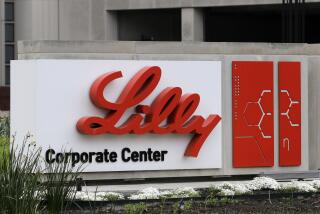Anti-Inflammatory Drugs Found Not to Slow Alzheimer’s
- Share via
Alzheimer’s is not slowed by taking anti-inflammatory drugs, according to a yearlong study of people in the early stages of the brain disease, quashing hopes from other evidence that the therapy might be beneficial.
The finding, reported today in the Journal of the American Medical Assn., compared the progression of Alzheimer’s in 351 patients given either a placebo or one of two anti-inflammatory drugs -- naproxen or rofecoxib. The scientists reported no detectable benefit for those taking the drugs during the study.
The findings do not rule out a benefit from other nonsteroidal anti-inflammatories -- a class of drugs that includes aspirin and ibuprofen. However, no such benefit has yet been demonstrated, while it is known that these drugs can cause side effects such as gastrointestinal bleeding. “Based on all the evidence we have today, we should not be treating people with Alzheimer’s disease with anti-inflammatory drugs,” said Dr. Paul Aisen, principal investigator of the study and a professor of neurology and medicine at Georgetown University in Washington, D.C. “These drugs carry risks and have not been shown to be beneficial.”
Alzheimer’s, which afflicts more than 4 million Americans, is a degenerative brain condition characterized by clumps of protein fragments in the brain known as amyloid plaques.
Several strands of evidence suggested that inflammation plays a role in the disease. Thus, some researchers theorized that anti-inflammatories might help. Lab studies had indicated that enzymes causing inflammation were elevated in the brains of Alzheimer’s patients, and mice with Alzheimer’s-like brain lesions improved when given this class of drugs.
Observations of human populations, such as in a large study published in 2001, had indicated that people who took naproxen and other nonsteroidals were at a lower risk of developing Alzheimer’s.
Scientists said the results from the new study were disappointing but not too surprising. Several other recent trials had reported negative results of various anti-inflammatories in slowing Alzheimer’s.
But Dr. George Bartzokis, director of an Alzheimer’s and memory disorders clinic at UCLA, said it is still possible that drugs such as naproxen could help prevent Alzheimer’s in people who have not yet developed it. Some children of Alzheimer’s patients are taking nonsteroidals to try to avoid getting the disease.
Dr. Lon Schneider, a professor of psychiatry, neurology and gerontology at USC, cautioned that the benefits of that strategy have not been proven, although the side effects are real.
A large clinical trial is testing naproxen and another nonsteroidal anti-inflammatory, celecoxib, in preventing the onset of Alzheimer’s.






